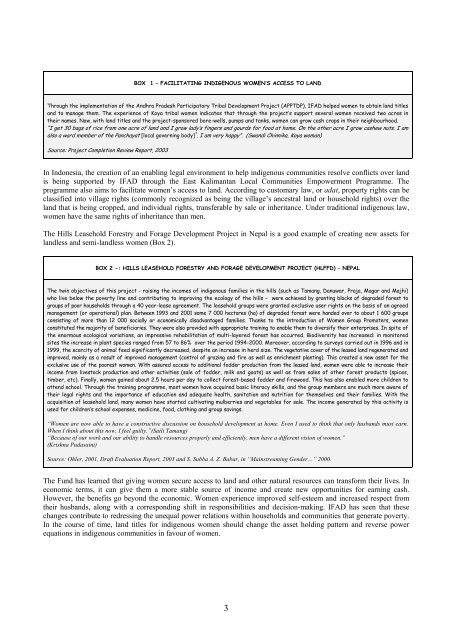Enhancing the Role of Indigenous Women in Sustainable ...
Enhancing the Role of Indigenous Women in Sustainable ...
Enhancing the Role of Indigenous Women in Sustainable ...
Create successful ePaper yourself
Turn your PDF publications into a flip-book with our unique Google optimized e-Paper software.
BOX 1 – FACILITATING INDIGENOUS WOMEN’S ACCESS TO LAND<br />
Through <strong>the</strong> implementation <strong>of</strong> <strong>the</strong> Andhra Pradesh Participatory Tribal Development Project (APPTDP), IFAD helped women to obta<strong>in</strong> land titles<br />
and to manage <strong>the</strong>m. The experience <strong>of</strong> Koya tribal women <strong>in</strong>dicates that through <strong>the</strong> project’s support several women received two acres <strong>in</strong><br />
<strong>the</strong>ir names. Now, with land titles and <strong>the</strong> project-sponsored bore-wells, pumps and tanks, women can grow cash crops <strong>in</strong> <strong>the</strong>ir neighbourhood.<br />
“I get 30 bags <strong>of</strong> rice from one acre <strong>of</strong> land and I grow lady’s f<strong>in</strong>gers and gourds for food at home. On <strong>the</strong> o<strong>the</strong>r acre I grow cashew nuts. I am<br />
also a ward member <strong>of</strong> <strong>the</strong> Panchayat [local govern<strong>in</strong>g body] * . I am very happy”. (Swandi Ch<strong>in</strong>nika, Koya woman)<br />
Source: Project Completion Review Report, 2003<br />
In Indonesia, <strong>the</strong> creation <strong>of</strong> an enabl<strong>in</strong>g legal environment to help <strong>in</strong>digenous communities resolve conflicts over land<br />
is be<strong>in</strong>g supported by IFAD through <strong>the</strong> East Kalimantan Local Communities Empowerment Programme. The<br />
programme also aims to facilitate women’s access to land. Accord<strong>in</strong>g to customary law, or adat, property rights can be<br />
classified <strong>in</strong>to village rights (commonly recognized as be<strong>in</strong>g <strong>the</strong> village’s ancestral land or household rights) over <strong>the</strong><br />
land that is be<strong>in</strong>g cropped, and <strong>in</strong>dividual rights, transferable by sale or <strong>in</strong>heritance. Under traditional <strong>in</strong>digenous law,<br />
women have <strong>the</strong> same rights <strong>of</strong> <strong>in</strong>heritance than men.<br />
The Hills Leasehold Forestry and Forage Development Project <strong>in</strong> Nepal is a good example <strong>of</strong> creat<strong>in</strong>g new assets for<br />
landless and semi-landless women (Box 2).<br />
BOX 2 -: HILLS LEASEHOLD FORESTRY AND FORAGE DEVELOPMENT PROJECT (HLFFD) – NEPAL<br />
The tw<strong>in</strong> objectives <strong>of</strong> this project - rais<strong>in</strong>g <strong>the</strong> <strong>in</strong>comes <strong>of</strong> <strong>in</strong>digenous families <strong>in</strong> <strong>the</strong> hills (such as Tamang, Danuwar, Praja, Magar and Majhi)<br />
who live below <strong>the</strong> poverty l<strong>in</strong>e and contribut<strong>in</strong>g to improv<strong>in</strong>g <strong>the</strong> ecology <strong>of</strong> <strong>the</strong> hills – were achieved by grant<strong>in</strong>g blocks <strong>of</strong> degraded forest to<br />
groups <strong>of</strong> poor households through a 40 year-lease agreement. The leasehold groups were granted exclusive user rights on <strong>the</strong> basis <strong>of</strong> an agreed<br />
management (or operational) plan. Between 1993 and 2001 some 7 000 hectares (ha) <strong>of</strong> degraded forest were handed over to about 1 600 groups<br />
consist<strong>in</strong>g <strong>of</strong> more than 12 000 socially or economically disadvantaged families. Thanks to <strong>the</strong> <strong>in</strong>troduction <strong>of</strong> <strong>Women</strong> Group Promoters, women<br />
constituted <strong>the</strong> majority <strong>of</strong> beneficiaries. They were also provided with appropriate tra<strong>in</strong><strong>in</strong>g to enable <strong>the</strong>m to diversify <strong>the</strong>ir enterprises. In spite <strong>of</strong><br />
<strong>the</strong> enormous ecological variations, an impressive rehabilitation <strong>of</strong> multi-layered forest has occurred. Biodiversity has <strong>in</strong>creased: <strong>in</strong> monitored<br />
sites <strong>the</strong> <strong>in</strong>crease <strong>in</strong> plant species ranged from 57 to 86% over <strong>the</strong> period 1994-2000. Moreover, accord<strong>in</strong>g to surveys carried out <strong>in</strong> 1996 and <strong>in</strong><br />
1999, <strong>the</strong> scarcity <strong>of</strong> animal feed significantly decreased, despite an <strong>in</strong>crease <strong>in</strong> herd size. The vegetative cover <strong>of</strong> <strong>the</strong> leased land regenerated and<br />
improved, ma<strong>in</strong>ly as a result <strong>of</strong> improved management (control <strong>of</strong> graz<strong>in</strong>g and fire as well as enrichment plant<strong>in</strong>g). This created a new asset for <strong>the</strong><br />
exclusive use <strong>of</strong> <strong>the</strong> poorest women. With assured access to additional fodder production from <strong>the</strong> leased land, women were able to <strong>in</strong>crease <strong>the</strong>ir<br />
<strong>in</strong>come from livestock production and o<strong>the</strong>r activities (sale <strong>of</strong> fodder, milk and goats) as well as from sales <strong>of</strong> o<strong>the</strong>r forest products (spices,<br />
timber, etc). F<strong>in</strong>ally, women ga<strong>in</strong>ed about 2.5 hours per day to collect forest-based fodder and firewood. This has also enabled more children to<br />
attend school. Through <strong>the</strong> tra<strong>in</strong><strong>in</strong>g programme, most women have acquired basic literacy skills, and <strong>the</strong> group members are much more aware <strong>of</strong><br />
<strong>the</strong>ir legal rights and <strong>the</strong> importance <strong>of</strong> education and adequate health, sanitation and nutrition for <strong>the</strong>mselves and <strong>the</strong>ir families. With <strong>the</strong><br />
acquisition <strong>of</strong> leasehold land, many women have started cultivat<strong>in</strong>g mulberries and vegetables for sale. The <strong>in</strong>come generated by this activity is<br />
used for children’s school expenses, medic<strong>in</strong>e, food, cloth<strong>in</strong>g and group sav<strong>in</strong>gs.<br />
“<strong>Women</strong> are now able to have a constructive discussion on household development at home. Even I used to th<strong>in</strong>k that only husbands must earn.<br />
When I th<strong>in</strong>k about this now, I feel guilty.”(Saili Tamang)<br />
“Because <strong>of</strong> our work and our ability to handle resources properly and efficiently, men have a different vision <strong>of</strong> women.”<br />
(Krishna Pudasa<strong>in</strong>i)<br />
Source: Ohler, 2001, Draft Evaluation Report, 2003 and S. Subba A. Z. Babar, <strong>in</strong> “Ma<strong>in</strong>stream<strong>in</strong>g Gender…” 2000.<br />
The Fund has learned that giv<strong>in</strong>g women secure access to land and o<strong>the</strong>r natural resources can transform <strong>the</strong>ir lives. In<br />
economic terms, it can give <strong>the</strong>m a more stable source <strong>of</strong> <strong>in</strong>come and create new opportunities for earn<strong>in</strong>g cash.<br />
However, <strong>the</strong> benefits go beyond <strong>the</strong> economic. <strong>Women</strong> experience improved self-esteem and <strong>in</strong>creased respect from<br />
<strong>the</strong>ir husbands, along with a correspond<strong>in</strong>g shift <strong>in</strong> responsibilities and decision-mak<strong>in</strong>g. IFAD has seen that <strong>the</strong>se<br />
changes contribute to redress<strong>in</strong>g <strong>the</strong> unequal power relations with<strong>in</strong> households and communities that generate poverty.<br />
In <strong>the</strong> course <strong>of</strong> time, land titles for <strong>in</strong>digenous women should change <strong>the</strong> asset hold<strong>in</strong>g pattern and reverse power<br />
equations <strong>in</strong> <strong>in</strong>digenous communities <strong>in</strong> favour <strong>of</strong> women.<br />
3

















